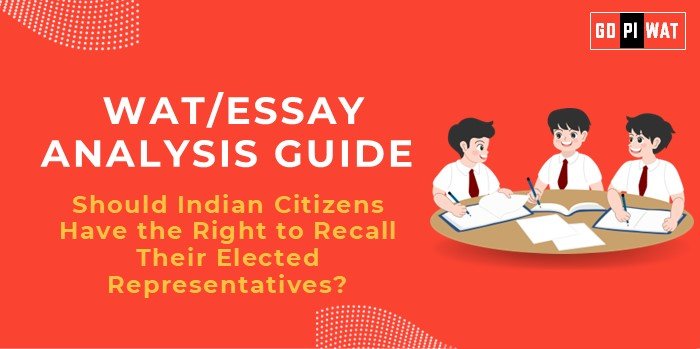🖋️ Written Ability Test (WAT)/Essay Analysis Guide: Should Indian Citizens Have the Right to Recall Their Elected Representatives?
🌟 Understanding the Topic’s Importance
The question of introducing the right to recall elected representatives in India holds immense significance in promoting accountability and addressing governance gaps. As India aspires to strengthen its democratic institutions, adopting this measure could align with global practices while fostering a more engaged and empowered electorate.
📝 Effective Planning and Writing
- Time Allocation:
- ⏳ Planning: 5 minutes
- ✍️ Writing: 20 minutes
- 🔍 Review: 5 minutes
- Structure:
- 📜 Introduction: 70 words
- 📖 Body: 350 words
- 📝 Conclusion: 70 words
🎯 Introduction Techniques for Essays
- Contrast Approach:
“India, the world’s largest democracy, often faces criticism for gaps in governance accountability post-elections. Introducing recall rights can empower citizens to hold their representatives accountable and improve the quality of leadership.”
- Solution-Based Approach:
“The right to recall elected representatives could be a transformative step in addressing governance inefficiencies in India, ensuring that public office holders remain responsive and accountable to citizens.”
🔍 Structuring the Essay Body
- Achievements:
- ✅ Accountability: Recall rights foster accountability, making representatives more responsive.
- 🌍 Global Examples: Switzerland and some US states demonstrate its effectiveness in improving governance standards.
- 📈 Indian Implementation: India’s partial implementation at the panchayat level, such as in Madhya Pradesh, has shown positive outcomes.
- Challenges:
- ⚠️ Misuse Risk: Potential exploitation by political rivals, leading to unnecessary disruptions.
- 💸 Administrative Burden: High financial and logistical costs associated with recall elections.
- 📚 Lack of Political Literacy: Citizens may make uninformed decisions, undermining the mechanism’s intent.
- Future Outlook:
- ✔️ Safeguards: Establish stringent criteria to prevent misuse, such as requiring substantial voter support to initiate recalls.
- 📖 Voter Education: Invest in public awareness campaigns to ensure informed and responsible participation.
- 🌟 Phased Introduction: Start with localized trials to evaluate feasibility before expanding nationwide.
💡 Concluding Effectively
- Balanced Perspective:
“While the right to recall can revolutionize governance by enhancing accountability, it must be implemented with caution to prevent instability. Phased trials and public education are critical to its success.”
- Global Comparison:
“Learning from the successes of Switzerland and the US, India can adopt recall provisions tailored to its unique challenges. With proper safeguards, this measure could strengthen its democratic framework.”
📚 Sample Short Essays
- Balanced Perspective:
“Recall rights can transform Indian democracy by empowering voters to demand accountability from their leaders. However, this powerful tool must be introduced cautiously, with robust safeguards to prevent misuse and ensure administrative efficiency. Switzerland’s effective implementation highlights its potential, while Venezuela’s challenges underscore the need for careful planning. A phased introduction in India, coupled with strong public awareness initiatives, could create a balance between empowerment and stability, reinforcing the democratic ethos of the nation.”
- Solution-Oriented:
“India’s democratic institutions would greatly benefit from the right to recall elected representatives. This provision could address accountability gaps and foster trust in governance. Lessons from Switzerland and localized Indian examples, such as panchayat-level recalls in Madhya Pradesh, illustrate its potential to improve governance. To succeed, India must establish clear criteria for recalls, ensure voter education, and adopt a gradual implementation strategy. By empowering citizens without destabilizing governance, the right to recall can make democracy more participatory and effective.”
- Global Comparison:
“Globally, recall rights are seen as a tool for enhancing governance. Democracies like Switzerland and some US states demonstrate how this provision holds leaders accountable, ensuring they serve the public interest. For India, implementing recall rights can address growing dissatisfaction with elected representatives. However, India must tailor this mechanism to its unique democratic challenges, focusing on education and safeguards. By learning from global practices and adapting them wisely, India can ensure that recall rights strengthen its democracy rather than disrupt it.”


